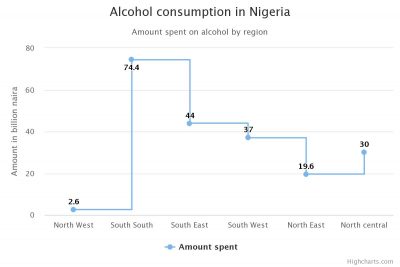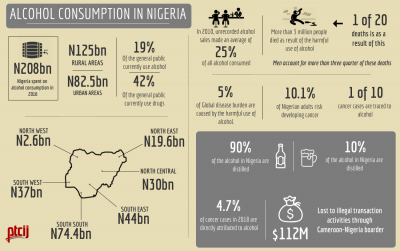South-south leads Nigeria’s huge alcohol consumption, NBS data shows


alcohol-consumption-in-n

A breakdown of the nation’s sobriety pattern shows the South South zone is the least restrained community of alcohol consumers. There, N74.4 billion was spent on alcohol, making the states of Delta, Edo, Bayelsa, Rivers, Akwa Ibom, and Cross Rivers the section of the country inhabiting the most enthusiastic drinkers in the year.
The seven states of Jigawa, Kaduna, Katsina, Kebbi, Kano, Sokoto, and Zamfara, making up the North West zone, comparatively have the most restrained drinkers. But they still spent at least N2.6 billion to assuage the palate of alcohol drinkers.
Federal statisticians at the NBS say the South East with N44 billion, the South West with N37 billion, the North-central with N30 billion, and the North-east with N19.6 billion follow in that sequence of alcohol consumers in the country.
However, in terms of rural-urban divide, federal statisticians say there are way more drinkers in Nigeria’s rural communities than in the urban areas. Rural communities spent N125 billion naira on alcohol consumption, whilst the urban spend N82.5 billion naira.
Abubakar Jimoh, director of special duties for the nation’s food and drug agency, NAFDAC, blamed what appears to be the high level of alcohol consumption in Nigeria on factors that include the relatively unfettered access to the products, and a disposition of Nigerians to abuse the bounds of regulation.
“Many of this alcohol are stored in a sachet and as such it is predisposing people to more alcohol consumption which is injurious to public health, under the realm of packaging and trying to modernise things.
“We try to license people in packaging to make things easier for citizens, however, we just discovered that people have started abusing it,” bemoaned Mr. Jimoh who hinted that the administration is in the process of addressing the problem.
“We are trying to see what we can do about that, the discussion is still on and I am not trying to preempt what decision will be taken at the ministerial level. The honourable minister is also involved, trying to see the regulations and how they can protect public health, because the small sachet thing is predisposing people to more alcohol. It is easier for people to buy in small sachets which increases the quantum of the consumed alcohol,” Mr Jimoh told PREMIUM TIMES in an interview.



What health experts say about alcohol consumption
According to the International Agency for Research on Cancer (IARC), one of every 10 cancer cases in Nigeria can be traced to alcohol, and 4.7 per cent of overall cancer cases in Nigeria last year can be attributed to alcohol.
The World Health Organisation (WHO) said in 2014, Nigeria consumed an average of 23.1 litres of pure alcohol annually, while 50.1g of pure alcohol is consumed daily by drinkers aged 15 years and above.
In its Global Status Report on Alcohol and Health, the WHO also estimates that in 2016 more than three million people died all over the world as a result of the harmful use of alcohol.
This represents 1 in 20 deaths. Men accounted for more than three-quarters of these deaths. Overall, the harmful use of alcohol causes more than five per cent of the global disease burden.
Expert speaks
Tavershima Adongo, a medical consultant with the medical journalism programme at the Premium Times Centre for Investigative Journalism, explained that “Alcoholism is the chronic condition that develops from uncontrolled drinking and preoccupation with alcohol, leading to a physical and emotional dependence.” He added that “this condition affects about 1.5 million Nigerians yearly, often progressing from a state of alcohol abuse were individuals consume alcohol in sufficient quantities that can be in infrequent periods as once a week.”
Mr Adongo remarks that “immediate short term effects can include systemic effects such as nausea and vomiting, behavioural and mood affectation such as aggression, self destructive tendencies, hyperactivity and anxiety, to long term disease and personality changes that lead to disorganization with an overall effect on individual performance and interpersonal relationships.
“Dependence can occur as early as late teenage years -18, through mid adult life to old age >60 years. Studies have shown equal prevalence of consumption among this age range, indicating an early onset age of consumption in the country.
“Alcoholic liver cirrhosis, a disease that results from destruction of the liver cells, resulting from alcohol consumption by itself is reported to progressively lead to death, asides progressing to liver cancer.
“Other conditions such as acute pancreatitis with long term effects of pancreatic cancer have a higher tendency with increased intake.
“Drinking can be reduced with preventive strategies of regulation, and rehabilitation of victims which would involve the setting up of treatment centres in rehabilitative facilities. Discontinuing individuals from alcohol involves a programme of medical detoxification -which entails a gradual withdrawal process, as sudden lack of alcohol in the body can also cause mental confusion and emotional disruption and life threatening seizures.
“There exists no regulatory control on alcohol use presently in the country. The Ministry of health and the NAFDAC do not have any regulatory policy on alcohol. In the Northern part of the country Islamic sharia law prohibits consumption through forceful arrests of individuals, and confiscation of products. An expanded policy would be needed if consumption is to be regulated with an impact on health and the market,” Mr Adongo stated.
Economic Implication
The issue with illicit production has always been an issue around alcohol. But in Nigeria, no data points to total monetary loss as a result of illicit production and consumption. However, Cameroon, which shares boundary Nigeria, lost 112 million dollars to illicit alcohol in 2014, according to IARD.
A 2017 study of ‘The Illicit Production and Consumption of Ògógóró in Coastal Yorùbáland and the Niger Delta’ by Dọlápọ` Olúpàyímọ of the Adeyemi College of Education in Ondo attributes the revenue leakage to the challenge of regulation because the products are “often traded through distribution networks that are semi-legal or illegal in other ways, usually because they have no NAFDAC registration and/or avoid taxation of Ògógóró (alcohol) and sometimes other traded goods.”
Consumers reaction
David Opeyemi, who resides in Ilorin, Kwara State, and who says he “drinks to cool down the stress of the day,” links preponderant drinking to a cocktail of factors that include aphrodisiac, recreational, peer pressure, and family history with addiction. He contrasted drinking patterns of the past which for him are moderate to modern drinking predominant among young people and adults within the age of 18 to 45 years of age.
Also, a Lagos-based vulcaniser, who identified himself as Mr Olamilekan, but prefers to be known as “Be Happy,” said, ”When I am troubled I take a minimum of 4 bottles of beer or a large bottle of Lord gin drink.” Pointing to a can of energy drink, Mr Olamilekan said the range of preferred labels in the market now is expanding. He said the lacing of liquor with energy drink has now captured poor consumer imagination at the urban and rural areas. “That works best for us as the beverage of choice,” said the happy vulcaniser. (Premium Times)


